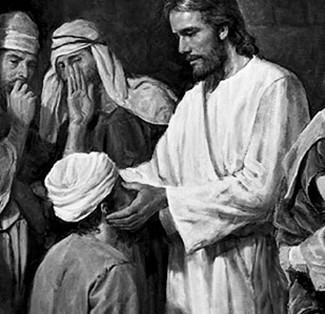Jesus is the Presence among us who interprets for us what may seem to be incomprehensible. He goes "beyond the boundaries" of what's acceptable or the "status quo." He makes our hearts burn again, as once they burned before. And he comes to us as He always said he would - as the hungry man, the thirsty woman, the naked child, the sick, the homeless, the condemned prisoner, or the ancient enemy.
 What's interesting about the Gospel of Mark is this: It does not concentrate so much on the teachings of Jesus, but on the mystery of Jesus as a person and the gradual way in which people came to understand him, how they came to understand their faith and finally how the impact of their encounters with him enabled them to share this faith with others. It is a story about Jesus as "a man with a plan." It is the story about Jesus breaking into human life as good news.
What's interesting about the Gospel of Mark is this: It does not concentrate so much on the teachings of Jesus, but on the mystery of Jesus as a person and the gradual way in which people came to understand him, how they came to understand their faith and finally how the impact of their encounters with him enabled them to share this faith with others. It is a story about Jesus as "a man with a plan." It is the story about Jesus breaking into human life as good news.
The cure of the deaf-mute in today's Gospel passage points to a deeper reality. It is much more than just the healing of one person in need. We are told that Jesus returned "into the district of the ten cities." This is Gentile country, and it is interesting to note that, throughout his ministry, Jesus very seldom ventured across geographical boundaries. Yet he always ventured across political boundaries, religious boundaries and societal boundaries.
He constantly surrounded himself with those who were the outcasts of society, those "on the fringe" - people whose lives were considered to be less than perfect, less than whole. He embraced those whose eyes could not see but within whose hearts shined the light of understanding. He touched those whose ears were stopped up tight, and yet these were those who heard his message as clear as bell from deep within their being. And he held close those whom society and religion saw as diseased or sinful because he was able to look beyond outward appearances to find their inner worth.
The Gospel Story today tells us that we cannot exist on our own. We need His touch to open our deaf ears. We need his Light to enable us to see clearly in the darkness with the eyes of faith. We need his very Body and Blood to give us the strength to persist in our journey when despair surrounds us.
The healing of the deaf-mute is a lesson that we all need to remember when the weather worsens, when the winds whip up, when we cover our ears to that which makes us afraid, and when we cry out from the depths, hoping that God will answer. And we are clearly reminded that we cannot exist without the support and love of one another.
This is His "new commandment." We are not only touched by Him and connected to Him but to one another as well. He spoke words of comfort, he healed the sick, he brought the gift of hearing to those who were deaf, he rebuked those who needed to be rebuked. And he spent time in prayer and in communion with the Father and with ordinary people. Ultimately he laid down his life for those ordinary people. And He invites and calls us to go and do likewise.
His message is not an easy one to hear - especially during the times in which we live. One of the most difficult facets of Christianity is that it continually invites us to re-imagine how the whole process works. There can be no compromise when it comes to the message of Christ. With Jesus, it's all or nothing. His invitation to follow Him is one that requires both courage and generosity.
The Gospel message has never needed to be proclaimed more urgently. This is our heritage and we are expected to translate our encounters with Christ into the kind of faith, hope and love that we need to heal and transform the world





